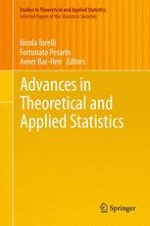2013 | OriginalPaper | Chapter
32. Do Union Formation and Childbearing Improve Subjective Well-being? An Application of Propensity Score Matching to a Bulgarian Panel
Authors : Emiliano Sironi, Francesco C. Billari
Published in: Advances in Theoretical and Applied Statistics
Publisher: Springer Berlin Heidelberg
Activate our intelligent search to find suitable subject content or patents.
Select sections of text to find matching patents with Artificial Intelligence. powered by
Select sections of text to find additional relevant content using AI-assisted search. powered by
